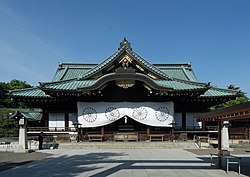Yasukuni Shrine
| The Imperial Shrine of Yasukuni 靖国神社 The Yasukuni Shrine |
|
|---|---|

The haiden (hall of worship)
|
|
| Information | |
| Type |
Chokusaisha (Former bekkaku-kanpeisha) |
| Dedicated to | Individuals who lost their lives while serving Japan All war dead regardless of nationality and side Some pet animals who also died are also enshrined |
| Founded | June 1869 |
| Founder(s) | Emperor Meiji |
| Priest(s) | Yasuhisa Tokugawa (徳川康久) |
| Reisai | Shunki Reitaisai (Spring) Shuki Reitaisai (Autumn) |
| Honden style |
Shinmei-zukuri, Copper roofing (doubanbuki) |
| Address | 3-1-1 Kudankita, Chiyoda, Tokyo 102-8246, Japan |
| Website | www |
|
|
|
The Imperial Shrine of Yasukuni, informally known as the Yasukuni Shrine (靖国神社 or 靖國神社 Yasukuni Jinja?), is a Shinto shrine located in Chiyoda, Tokyo, Japan. It was founded by Emperor Meiji and commemorates those who died in service of the Empire of Japan, which existed from the Meiji Restoration of 1869 until the nation was renamed during the Allied occupation in 1947. The shrine's purpose has been expanded over the years to include those who died in the wars involving Japan spanning from the entire Meiji and Taishō period, and lesser part of the Shōwa period.
The shrine lists the names, origins, birthdates, and places of death of 2,466,532 people and animals. Among those are 1,068 considered war criminals, 14 of whom are considered A-Class (leading to the Yasukuni controversies). Another memorial at the Honden building commemorates anyone who died on behalf of the Japanese empire, but includes Koreans and Taiwanese who served Japan at the time. In addition, the Chinreisha building is a shrine built to inter the souls of all the people who died during WWII, regardless of their nationality. It is located directly south of the Yasukuni Honden.
...
Wikipedia
